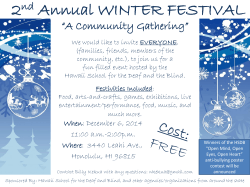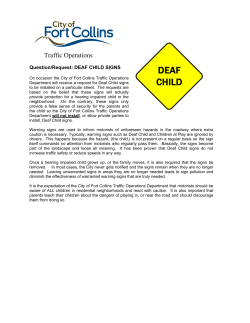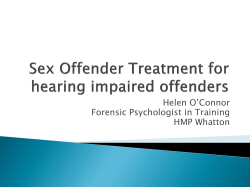
Educational Interpreter Performance Assessment (EIPA) Video Conference Workshops December 6, 2014
Educational Interpreter Performance Assessment (EIPA) Video Conference Workshops December 6, 2014 February 7, 2015 April 11, 2015 The workshops are designed for interpreters working in K-12 classroom settings, community interpreters, future interpreters, K-12 interpreter mentors, deaf educators and individuals supervising or working with interpreters. There is no fee to attend the workshops but registration is required. December 6, 2014, 10:00 a.m. - 2:00 p.m. CT Making Your Interpretation Dynamic: Incorporating Classifiers - Frances J. Beaurivage, Manager, EIPA Diagnostic Center, RID CI/CT Classifiers are a feature used in ASL to describe objects or groups of objects. We will discuss a variety of the acceptable classifier hand shapes and how hand shape movements change meaning. Participants will view several deaf adults telling a story using a variety of classifiers. Practice activities will focus on classifiers that can be used to represent sports events, body parts, the solar system and a variety of science concepts. February 7, 2015, 10:00 a.m. - 2:00 p.m. CT Language and Theory of Mind in Deaf Children: What Educational Interpreters Need To Know - Brenda Schick, Ph. D, Author of the EIPA, Professor at University of Colorado at Boulder in the Speech, Language and Hearing Sciences Department The acquisition of a Theory of Mind (ToM) is an important milestone in the development of cognitive skills, allowing children to understand that people can differ in their beliefs. ToM is important in literacy skills, socio-pragmatic skills, and academic success. This workshop will describe ToM and causes for its delayed acquisition in deaf children. We will review texts and work on interpreting ToM concepts, discuss how ToM is represented in sign language, and explore why representing classroom ToM talk is essential. April 11, 2015, 10:00 a.m. - 2:00 p.m. CT Ethical Practices and Guiding Principles for Educational Interpreters - Barbara J. Woodhead, EIPA Rater, RID CI/CT, B.A. English and Co-Presenter (TBD) As employees of an educational system and as members of an educational team, interpreters are expected to adhere to professional standards and guidelines. This training will address best practices for providing effective and appropriate services in the diverse demands of K-12 settings. The workshop will discuss communication strategies when working with various members of the educational team, the importance of understanding the teachers’ goals, the role of the educational interpreter in IEP meetings, guidelines for maintaining professional boundaries with students, strategies for conflict resolution, and the interpreter’s obligation to adhere to state and federal laws. Nebraska Commission for the Deaf and Hard of Hearing is an approved RID CMP sponsor for continuing education activities. We will be pursuing CEU approval for each video conference. Locations SCKESC [South Central Kansas Education Service Center] - 13939 Diagonal Rd. – Clearwater SEKESC [Southeast Kansas Education Service Center] – 947 W. 47 Highway - Girard NKESC [Northwest Kansas Educational Service Center] - 703 West Second - Oakley Kansas State School for the Deaf - 450 E Park - Olathe Salina [K State at Salina- 2310 Centennial - Technology Center 120]- Salina SWPRSC [Southwest Plains Regional Service Center] - 900 Lark Ave. - Sublette KSDE – 900 SW Jackson St., Rm. 355 (South Entrance- 3rd Floor)-Topeka There is no registration fee. Due to limited seating, pre-registration is required. Contact Karen Maddox at 785291-3098 or kmaddox@ksde.org to make your reservation prior to Dec. 1, 2014 for the Dec. 6th Workshop.
© Copyright 2025





















